

Rosicrucianism. Rosicrucianism is a philosophical secret society said[1] to have been founded in late medieval Germany by Christian Rosenkreuz.
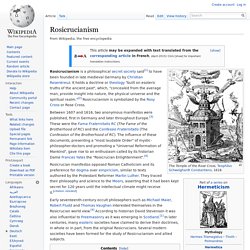
It holds a doctrine or theology "built on esoteric truths of the ancient past", which, "concealed from the average man, provide insight into nature, the physical universe and the spiritual realm. "[2] Rosicrucianism is symbolized by the Rosy Cross or Rose Cross. Between 1607 and 1616, two anonymous manifestos were published, first in Germany and later throughout Europe.[3] These were the Fama Fraternitatis RC (The Fame of the Brotherhood of RC) and the Confessio Fraternitatis (The Confession of the Brotherhood of RC).
The influence of these documents, presenting a "most laudable Order" of mystic-philosopher-doctors and promoting a "Universal Reformation of Mankind", gave rise to an enthusiasm called by its historian Dame Frances Yates the "Rosicrucian Enlightenment".[4] Origins[edit] Reception[edit] Some[who?] Ancient Mystical Order Rosae Crucis. Official Worldwide Emblem of the Rosicrucian Order A Rosicrucian Master's Cross, from the AMORC Rosicrucian Library in San Jose The Ancient and Mystical Order Rosæ Crucis, also called the Rosicrucian Order (AMORC), is a worldwide philosophical and humanistic fraternal organization devoted to "the study of the elusive mysteries of life and the universe.
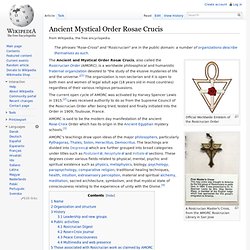
"[1] The organization is non-sectarian and it is open to both men and women of legal adult age (18 years old in most countries) regardless of their various religious persuasions. The current open cycle of AMORC was activated by Harvey Spencer Lewis in 1915.[2] Lewis received authority to do so from the Supreme Council of the Rosicrucian Order after being tried, tested and finally initiated into the Order in 1909, Toulouse, France. Christian Rosenkreuz.
Founder of the Rosicrucian Order Christian Rosenkreuz (also spelled Rosenkreutz and Christian Rose Cross) is the legendary, possibly allegorical, founder of the Rosicrucian Order (Order of the Rose Cross).
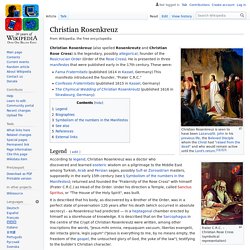
He is presented in three manifestos that were published early in the 17th century. These were: Fama Fraternitatis (published 1614 in Kassel, Germany) This manifesto introduced the founder, "Frater C.R.C. "Confessio Fraternitatis (published 1615 in Kassel, Germany)The Chymical Wedding of Christian Rosenkreutz (published 1616 in Strasbourg, Germany). Legend[edit] Frater C.R.C. – Christian Rose Cross (symbolical representation) It is described that his body, as discovered by a Brother of the Order, was in a perfect state of preservation 120 years after his death (which occurred in absolute secrecy) – as Rosenkreuz had predicted — in a heptagonal chamber erected by himself as a storehouse of knowledge.
Biographies[edit] Count of St. The Georgia Guidestones. It was an ordinary Friday afternoon in 1979 when he first appeared at the Elberton Granite Finishing Company.
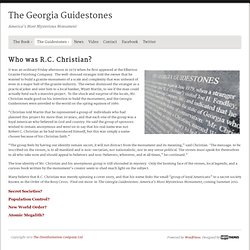
The well-dressed stranger told the owner that he wanted to build a granite monument of a scale and complexity that was unheard of even in a major hub of the granite industry. The owner dismissed the stranger as a practical joker and sent him to a local banker, Wyatt Martin, to see if the man could actually fund such a massive project. To the shock and surprise of the locals, Mr. Christian made good on his intention to build the monument, and the Georgia Guidestones were unveiled to the world on the spring equinox of 1980. “Christian told Martin that he represented a group of individuals who had planned this project for more than 20 years, and that each one of the group was a loyal American who believed in God and country.
“The group feels by having our identity remain secret, it will not distract from the monument and its meaning,” said Christian. The Georgia Guidestones. Temple of The Rosy Cross (1618) Source: wikimedia commons.
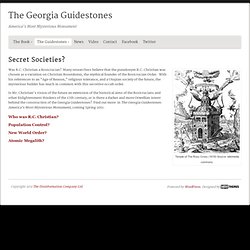
Was R.C. Christian a Rosicrucian? Many researchers believe that the pseudonym R.C. Christian was chosen as a variation on Christian Rosenkreuz, the mythical founder of the Rosicrucian Order. With his references to an “Age of Reason,” religious tolerance, and a Utopian society of the future, the mysterious builder has much in common with this secretive occult order. Is Mr. Who was R.C.
Population Control? New World Order? Atomic Megalith?